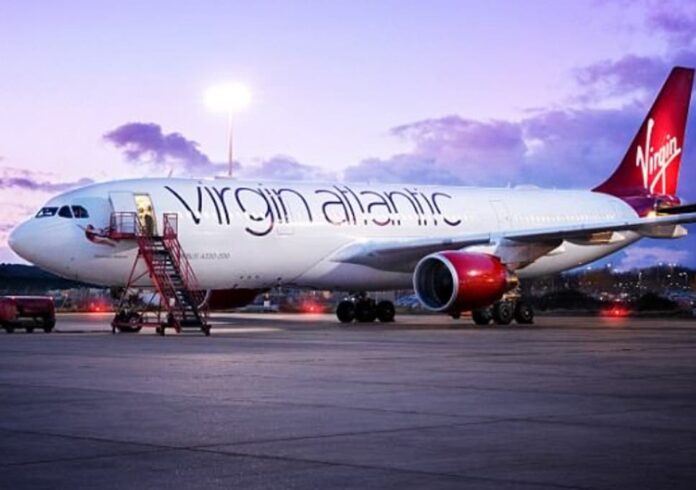LAHORE: Less than two years after launching operations in Pakistan, British airline Virgin Atlantic has decided to call it quits. According to a press release issued yesterday, the airline is planning on expanding its existing network and is in the process of reviewing its existing network as part of the process.
“They will indeed operate their summer schedule. This decision to suspend operations is for beyond the summer,” Saifullah Khan, Official Spokesperson for Pakistan’s Civil Aviation Authority, tells Profit.
The company served 249,207 passengers up until June 2022 based on the latest aviation statistics made available by the Pakistan Civil Aviation Authority (PCAA). The company has highlighted that its decision is based on its desire to utilise resources optimally in 2023 as it seeks to expand its activities. The company has, however, not highlighted where it will redeploy its resources to or why Pakistan does not align with its mission to increase resource utilisation. However, recent and upcoming events shed light on the possible reasons for why Virgin Atlantic did take its decision.
The earnings repatriation issue
The International Air Transport Association (IATA), the trade association for the world’s airlines representing some 300 airlines or 83% of total air traffic, accused Pakistan of disallowing foreign airlines from repatriating their earnings. IATA alleged that Pakistan has blocked $225 million in airline funds, making it the second largest market, after Nigeria ($551 million) and before Bangladesh ($208 million), to do so.
Yousaf Rizvi,Vice Chairman of the Travel Agents Association of Pakistan, claimed that this repatriation problem is the reason why Turkish Airways and Emirate Airlines have suspended directly selling tickets. He posits that they have done so to force customers to utilise their credit cards for payments, and thereby ensure that the airlines can circumvent local banking restrictions to repatriate their earnings.
“If we do not clear amounts then airlines may reduce the number of flights, and eventually stop operations thereby affecting our passenger and trade connectivity with the world,” explained Ammar H. Khan, an independent macroeconomist, to Profit when originally asked about the matter. “This also sends a negative signal to new investors, and aviation players looking to integrate with Pakistan,” Khan continued.
It is likely that Virgin Atlantic did not either possess the balance sheets to employ risky tactics like those utilised by Turkish Airways and Emirate Airlines, or it simply did not deem the Pakistani market worth the additional costs.
The potential return of PIA
Virgin Atlantic pivoted to Pakistan roughly six months after the crash of Flight 8303 on 22 May 2020 which led to, then Federal Minister for Aviation, Ghulam Sarwar Khan allege that 150 pilots had fake licences. This, subsequently, led to the European Union Aviation Safety Agency (EASA) implementing a ban on the carrier, with the Federal Aviation Administration (FAA) in the US following suit with a similar restriction. These routes accounted for 30-37% of PIA’s revenue according to Khan.
A team of experts from the UK Civil Aviation Authority arrived in Pakistan on February 8 to conduct an audit of the PCAA. This is to be followed by an audit of PIA by the European Union Aviation Safety Agency (EASA) on March 7. A successful audit could reinstate PIA’s access to Europe and the UK. Such a decision would be detrimental to Virgin Atlantic which currently banks on nonstop flights to the UK as its unique selling point.
The low yield argument and Virgin’s international plans
The final potential reason for Virgin Atlantic ceasing its Pakistan operations is likely to do with its upcoming membership of the SkyTeam alliance. The SkyTeam alliance is the second largest global international airline alliance comprising 19 carriers from five continents. Virgin Atlantic will become an official member on March 2.
Membership will enable Virgin to benefit from its peers through a myriad of benefits, most important of which is the potential for codesharing. This impending shakeup coincides with Virgin Atlantic’s decision to reinstate its flights to Shanghai later this year, a market that it had stopped serving during the Covid-19 pandemic. The confluence of these two factors, likely explains why Virgin Atlantic might deem its resources to be best utilised elsewhere. For context, the aforementioned Turkish Airlines and Emirates Airlines served 891,491 and 2.3 million passengers respectively over the same period that Virgin served its 249,207 passengers.
A combination of all the aforementioned factors is perhaps the likely reason. Virgin Atlantic’s abrupt decision comes a mere four months after its statement that it sought to double down on the Pakistani market due to the future potential it saw in it.





Any indications on what BA intends going forward?
i read your article its very informative for everyone thank you so much